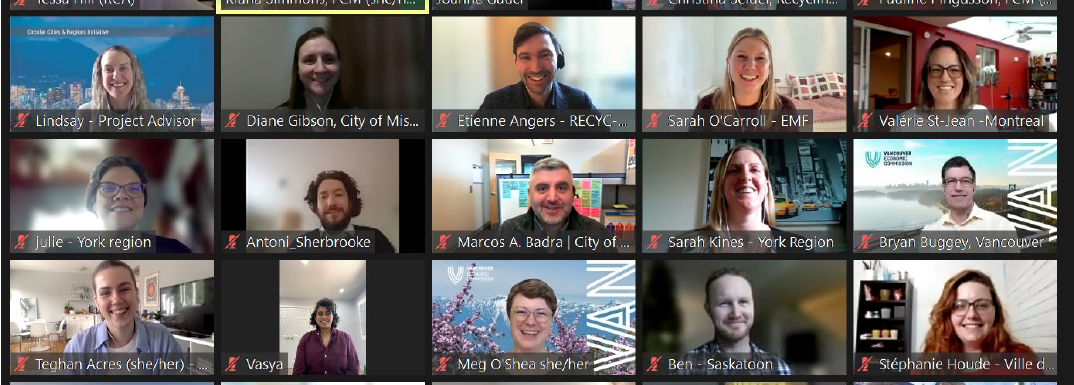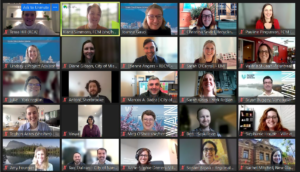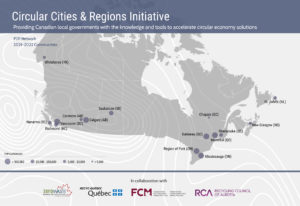Accelerating Canada’s Circular Economy

Projects Sponsor
Adoption of the circular economy is key to reaching net-zero, but while the principles of this economic model are simple, implementation can be complex. Fortunately, the Circular Cities and Regions Initiative (CCRI), through a partnership between the National Zero Waste Council, the Federation of Canadian Municipalities’ Green Municipal Fund, RECYC-QUÉBEC and the Recycling Council of Alberta, is helping to get the circular economy rolling, across the country. CCRI is providing local governments with the information and tools to accelerate circular economy solutions. Fifteen communities across Canada participated in the CCRI’s inaugural year and a new group of 10 communities have embarked on a similar journey for 2022/2023.
Because knowledge also has to do the rounds.
Put simply, the circular economy instructs us to do more and better with less: to first rethink our need for a product or particular resource, to design products to last and to be reused, and, finally, to give resources new life by ensuring they are recycled or put back into the system as opposed to creating waste.
The Circular Cities and Regions Initiative CCRI was launched to build circular economy knowledge and capacity in the Canadian local government sector. The circular economy provides a framework for achieving climate action commitments, while also nurturing a prosperous and equitable future for communities and businesses. The CCRI was designed with three objectives in mind: (1) supporting a national dialogue on best practices; (2) nurturing peer-to-peer connections and growing a community of practice; and (3) supporting communities in their own action planning process. The CCRI’s three program elements––the National Webinar Series, the Peer-to-Peer Network and the Community Action Planning Process––deliver on these goals.

Metro Vancouver and the National Zero Waste Council
But let’s go back to the beginning of these circle sessions.
In 2019, the National Zero Waste Council’s Circular Economy (CE) Working Group commissioned and published a global scan of city-led circular economy approaches to encourage the adoption of circular city approaches in Canada. This publication, Circular Cities: A Scan of Global Approaches and Key Takeaways for Canadian Local Governments, provided the jumping off point for the CCRI. The publication confirmed that while sector-specific strategies are critical to advancing circularity, local governments have a key role to play in facilitating, enabling, and catalysing the circular economy transition.
Cities, after all, contain a level of resource flows that can generate economies of scale to advance circular economy activities, as they directly interface with community stakeholders and other levels of government, and they provide key services and have access to legal tools to influence activities and behaviours in the community. The research also confirmed that while many local governments were starting to adopt circular economy approaches there was little documentation on implementation, particularly with respect to challenges and lessons learned, because the work was still so emergent.
From this, the idea to nurture peer-to-peer connections between practitioners was identified as an opportunity to facilitate the adoption of circular economy approaches in Canadian communities.
Following the publication of the Circular Cities Scan, the NZWC developed the concept of the CCRI, working closely with the Recycling Council of Alberta given the organisation’s circular economy expertise and leadership. The Recycling Council of Alberta co-chaired the NZWC CE Working Group and developed a unique provincial Circular Cities Project. The majority of 2020 focused on program design and partnership development, and the CCRI was launched as a one-year pilot in March of 2021 as a collaboration between the National Zero Waste Council, the Recycling Council of Alberta, the Federation of Canadian Municipalities’ Green Municipal Fund, and RECYC-QUÉBEC.
In its first year, the CCRI successfully achieved all of its key deliverables in the three program areas they had established. Their National Webinar Series delivered five public webinars, including one accelerator session at the 2021 World Circular Economy Forum. Their Peer-to-Peer Network was able to work directly with fifteen communities in a year-long process of knowledge sharing and knowledge building. The communities met monthly from June 2021 to April 2022 to discuss common challenges and approaches. They were provided access to a dedicated online learning hub and received in-depth access to circular economy experts, including two foundational workshops with the Ellen MacArthur Foundation. The two workshops were held for each of the 15 communities, mobilising staff around circular opportunities.
An independent evaluation of the CCRI identified new activities that were underway in the local governments as a result of their participation in the project. It was observed that staff were referencing CE more and making linkages to community examples. As well, staff had established check-ins across different departments and developed lists of early actions building on what they were already doing.
CE thinking had been integrated across departments and CCRI resource materials were being used to brief colleagues. Likewise, circular economy eligibility was included in their Community Grants program. Staff were going to Council with the roadmaps and accompanying reports they needed to make CE recommendations.
These were being added to City Plans.
The evaluation of the pilot found that it addressed a critical need and ‘unquestionably achieved its desired outcome, of increased technical capacity and awareness of Canadian local government staff to implement circular economy solutions’. The exit interviews with participants found that the communities deeply valued the program, particularly the monthly nature of the P2P Network sessions and the small cohort size which allowed for active engagement.

Circular Cities and Regions Initiative (CCRI) Community Map 2022
CCRI is providing Canadian local governments with the information and tools to accelerate circular economy solutions. Fifteen communities across Canada participated in the CCRI’s inaugural year and a new group of 10 communities have embarked on a similar journey for 2022/2023.
Because knowledge also must do the rounds.













